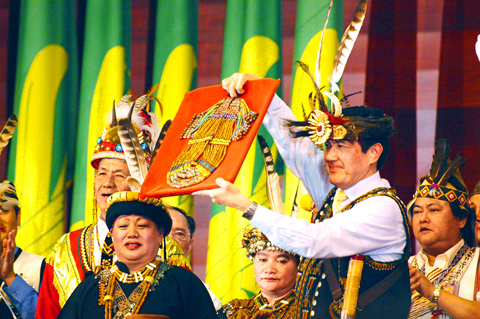President Ma Ying-jeou (馬英九) yesterday reaffirmed his earlier statement that relations between Taiwan and China are not state-to-state, but rather “region-to-region.”
“The relationship between Taiwan and Mainland China is not a state-to-state relationship,” Ma told a forum on constitutional interpretation held in Taipei yesterday.
“Within the framework of our Constitution, I would define the Mainland as ‘Mainland region’ and Taiwan as ‘Taiwan region’ — this is what the Act Governing Relations between the Peoples of the Taiwan Area and the Mainland Area [台灣地區與大陸地區人民關係條例] is all about,” he said.

PHOTO: CNA
Article 1 of the Act states that it was created to provide a legal basis for exchanges between the Taiwanese and the Chinese “before the unification of the country.”
The statute further defines “Taiwan area” as “Taiwan, Penghu, Kinmen and Matsu, as well as all other regions under the rule of the government” and “Mainland area” as “territories of the Republic of China [ROC] outside the Taiwan area.”
Ma said another reason why he would not define the Taiwan-China relationship as state-to-state was because “according to our Constitution, we cannot recognize that there is another country on the mainland, which is part of the ROC.”
Ma said that his definition did not downgrade Taiwan’s sovereignty, as it was based completely on the Constitution and the statute.
“This view is apparently acceptable to everyone, since neither former president Lee Teng-hui [李登輝] nor the former Democratic Progressive Party [DPP] has tried to change the statute,” he said.
Yesterday was not the first time Ma has made such comments. In an interview with the Mexican newspaper El Sol de Mexico in September, Ma made a similar statement, drawing sharp criticism.
Ma’s comments marked a complete change from the path taken by both Lee and former president Chen Shui-bian (陳水扁). When he was in office, Lee said the relationship between Taiwan and China was a “special state-to-state” relationship, while Chen simply said it was “state-to-state.”
Chinese Nationalist Party (KMT) Legislator Wu Yu-sheng (吳育昇) immediately lauded Ma’s definition of cross-strait relations as “logically accurate, legally appropriate” and a “clear interpretation of political reality.”
“This is exactly what the core spirit of the ROC Constitution is,” Wu said.
However, DPP Legislator Huang Wei-cher (黃偉哲) criticized Ma’s remark as “just the opposite to the political reality.”
“How is the mainland part of the ROC’s territory? How is the People’s Republic of China [PRC] not a country?” Huang asked. “This is total nonsense.”
He rebutted Ma’s claim that the DPP clearly approved of the statute because it had not attempted to revise it when it was in power.
“We couldn’t really change the law because we were a minority in the legislature — but that doesn’t mean we accept it,” Huang said. “In fact, we tried everything we could in our administrative power to strengthen Taiwan’s sovereignty.”
Chow Mei-li (周美里), spokeswoman of the Taiwan Solidarity Union, also disagreed with Ma.
“The ROC recognized the PRC as soon as former president Lee abolished the Temporary Provisions Effective During the Period of Communist Rebellion [動員戡亂時期臨時條款] and put an end to the Chinese Civil War,” Chow said in a telephone interview.
“What Ma said today would not only be rejected by China, but also unacceptable to all Taiwanese,” Chow said. “I’d like to remind him not to forget that he was elected by the people.”

Chinese spouse and influencer Guan Guan’s (關關) residency permit has been revoked for repeatedly posting pro-China videos that threaten national security, the National Immigration Agency confirmed today. Guan Guan has said many controversial statements in her videos posted to Douyin (抖音), including “the red flag will soon be painted all over Taiwan” and “Taiwan is an inseparable part of China,” and expressing hope for expedited reunification. The agency last year received multiple reports alleging that Guan Guan had advocated for armed reunification. After verifying the reports, the agency last month issued a notice requiring her to appear and explain her actions. Guan

GIVE AND TAKE: Blood demand continues to rise each year, while fewer young donors are available due to the nation’s falling birthrate, a doctor said Blood donors can redeem points earned from donations to obtain limited edition Formosan black bear travel mugs, the Kaohsiung Blood Center said yesterday, as it announced a goal of stocking 20,000 units of blood prior to the Lunar New Year. The last month of the lunar year is National Blood Donation Month, when local centers seek to stockpile blood for use during the Lunar New Year holiday. The blood demand in southern Taiwan — including Tainan and Kaohsiung, as well as Chiayi, Pingtung, Penghu and Taitung counties — is about 2,000 units per day, the center said. The donation campaign aims to boost

The Kaohsiung Tourism Bureau audited six hotels in an effort to prevent price gouging ahead of Korean band BTS’ concert tour in the city scheduled for Nov. 19, 21 and 22 this year. The bureau on Friday said that the audits — conducted in response to allegations of unfair pricing posted on social media — found no wrongdoing. These establishments included the local branches of Chateau de Chine, Hotel Nikko, My Humble House, and Grand Hai Lai, it said, adding that the Consumer Protection Commission would have penalized price gougers had the accusations been substantiated. The bureau said the Tourism Development Act

A preclearance service to facilitate entry for people traveling to select airports in Japan would be available from Thursday next week to Feb. 25 at Taiwan Taoyuan International Airport, Taoyuan International Airport Corp (TIAC) said on Tuesday. The service was first made available to Taiwanese travelers throughout the winter vacation of 2024 and during the Lunar New Year holiday. In addition to flights to the Japanese cities of Hakodate, Asahikawa, Akita, Sendai, Niigata, Okayama, Takamatsu, Kumamoto and Kagoshima, the service would be available to travelers to Kobe and Oita. The service can be accessed by passengers of 15 flight routes operated by